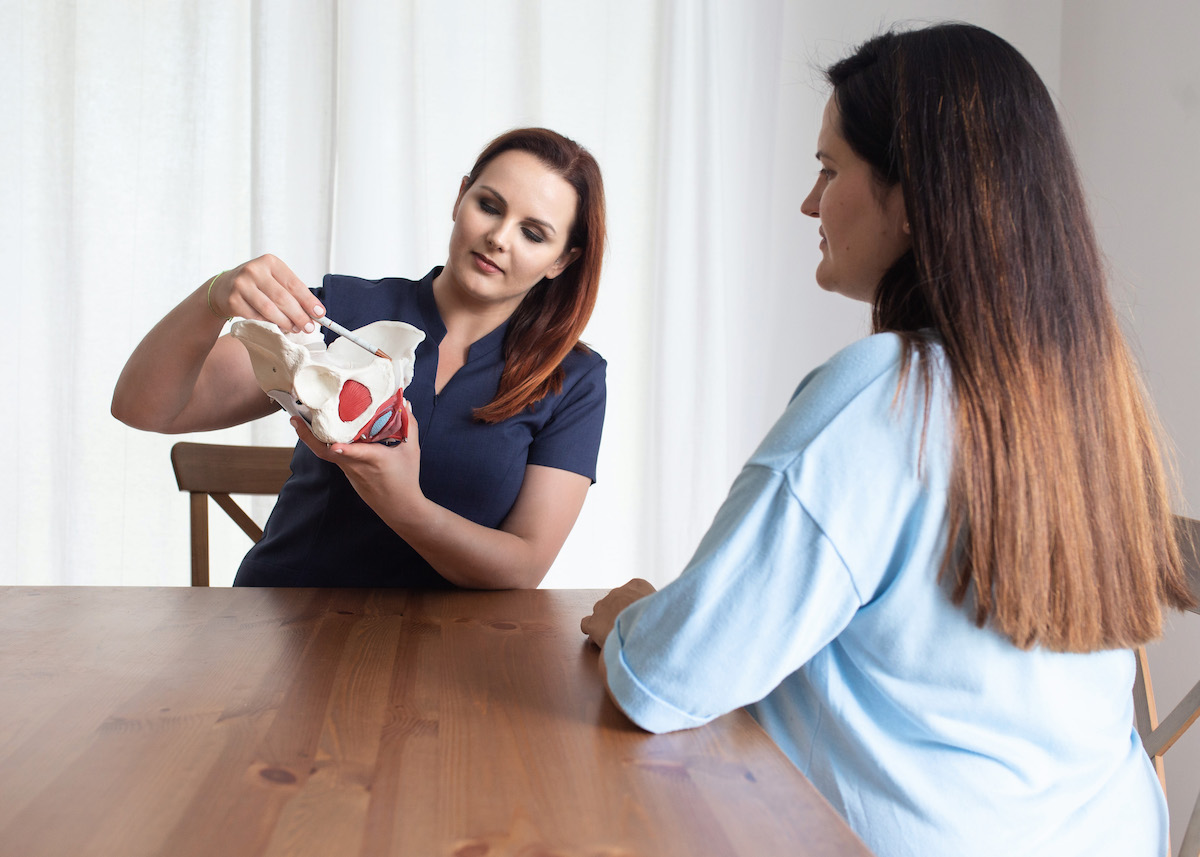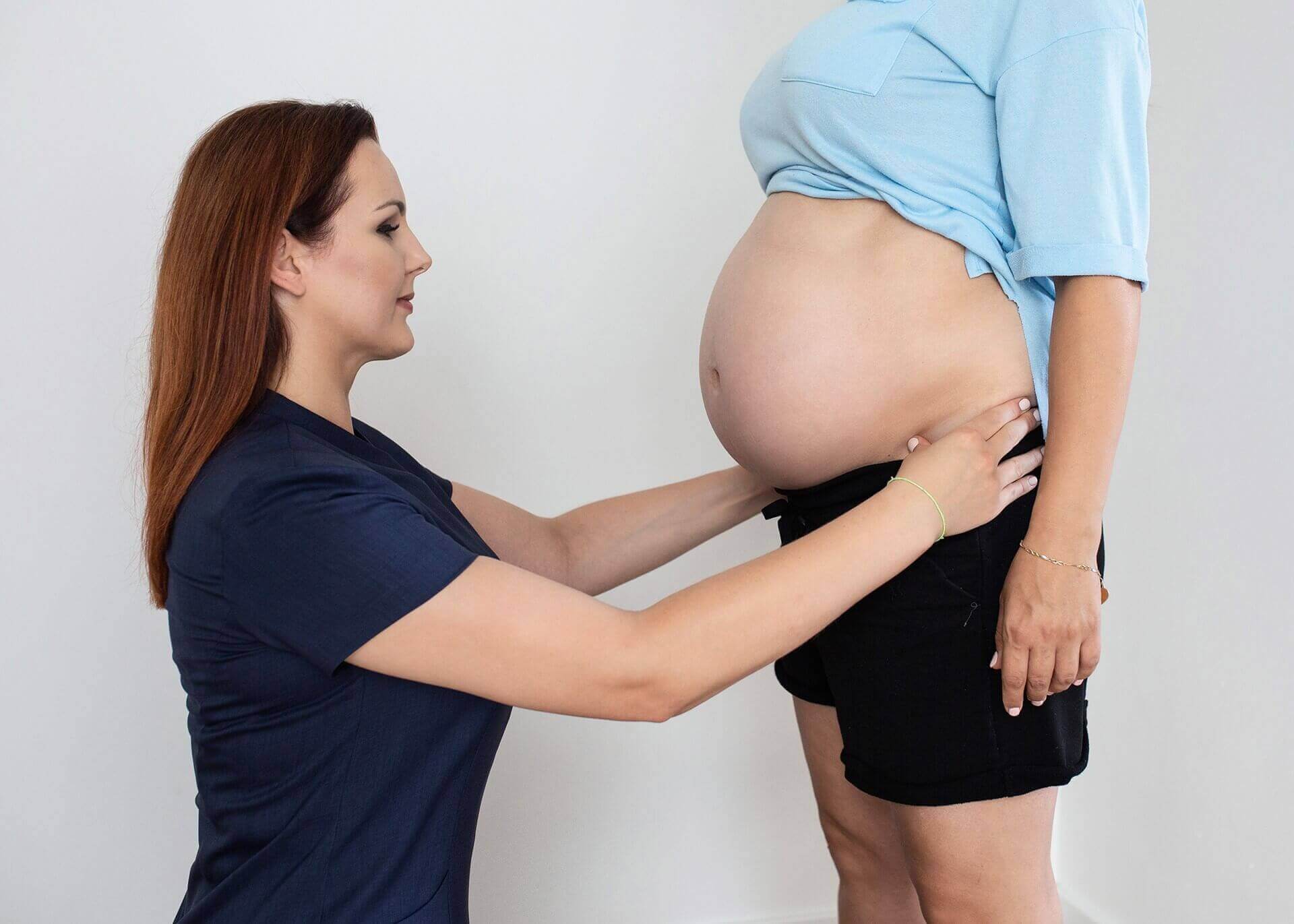What Does an Antenatal Physiotherapist Do?
A women's health physiotherapist works with a broad range of women's health matters, including issues related to pregnancy. Amongst other treatments, they help women with pelvic floor physio, prolapse, incontinence, back pain, scar treatment and breastfeeding problems. Women can suffer from these challenges and more after giving birth.
But many problems that require a new mummy physio approach can be minimised or even avoided altogether with the right pregnancy physiotherapy before birth.
Helping women prepare for giving birth and giving them tools to help with an easier labour are part of the role of ante natal physiotherapy in a women's health clinic. Here we will discuss the kinds of problems pregnant women might experience either before giving birth or postpartum, and you can find the physiotherapy treatments available to help alleviate the symptoms or to avoid the problems in the first place.


Role of Pregnancy Physiotherapy
Women in developed countries are fortunate to have advanced medical care. We have ready access to the results of studies into pregnancy and into treatments for pregnancy problems that benefit women when they are planning families. We can have a substantial say in how we experience our pregnancy and childbirth, and we are able to write our own birth story. Women have the option to consider what kind of pregnancy experience they would like to have, where to give birth, who will assist and what kind of medical intervention they would like to have or not like to have.
Pregnancy is a time of momentous change in a woman's body. There are all the changes you do see like the weight gain and the changing shape as breasts and baby bump grow. A growing pregnancy also affects women's posture, which can cause pain in the back or pelvic girdle. There are other impacts you might not see, like the feelings and experiences caused by hormonal changes. Pregnant women can also be prone to stress incontinence, causing bladder leakage when they sneeze or cough.
You may think that these issues are "normal" and that they are part and parcel of the pregnancy experience, but they are not inevitable. A practitioner of women's physio can help with assessments such the Mummy MOT for new mums.
Ante natal physiotherapy is one of the tools available to women to improve their health and wellbeing during pregnancy and even to improve their birth experience, their recovery and their postpartum health.
Studies into women's health physiotherapy conclude that having physiotherapy during pregnancy offers significant improvement to the health and wellbeing of pregnant women both before and after giving birth.
Women's health physiotherapists specialise in the pelvic floor, and pelvic floor health is a key factor in how well women experience their pregnancy, birth and beyond. Physiotherapy during pregnancy therefore has a significant role in preserving and improving women's health.

What Happens at an Antenatal Physiotherapy Consultation
An antenatal physiotherapy consultation might also be called a Pregnancy MOT. It is a specially designed women's health assessment tailored to help expecting mums deal with the changes of pregnancy and to prepare for the delivery. It will equip you with the knowledge you need during your pregnancy and post-birth. It is also very suitable for women who will be giving birth by C-section.
During your Pregnancy MOT, your specialist women's physio will give you a complete assessment to provide you with an effective programme that will help you regain function, improve strength and reduce pain for the rest of your exciting journey. The advice also extends to the early weeks post-birth.

This is what you can expect your antenatal physiotherapist to do at your consultation:
- Assessment of your posture and joints
- A comprehensive internal and external vaginal assessment of your pelvic floor muscles, including guidance on how to correctly contract and relax them
- Assessment and treatment of any hip, pelvic, coccyx or back pain
- Advice on labour, and help preparing your pelvic floor and pelvis for delivery
- Perineal massage
- Advice on how to exercise safely during pregnancy and how to minimise tummy separation (diastasis recti)
- Postpartum tips to help kick start your safe recovery postnatally until your 6 week check up Mummy MOT
- A chance to discuss any concerns you may have
Antenatal treatment techniques can include soft tissue massage, gentle joint mobilisation, manual therapy, lymphatic drainage, kinesio taping and more. Your women's health physiotherapist will also set you up with a programme of ante-natal exercises.
Why Antenatal Exercise is Important
Exercise is very important in pregnancy for a wealth of benefits, including reducing the risk of gestational diabetes, high blood pressure and pre-eclampsia; maintaining strong heart, lungs and muscles; helping to keep the baby's weight healthy; and even psychological wellbeing.
Did you know that the proper exercise can reduce the risk of pregnancy-related depression by more than 25%?
Women's health physio practitioners treat the whole woman, and physiotherapy during pregnancy is an important element in how women enjoy their pregnancy, their birth experience and their wellbeing postpartum. Your pregnancy physiotherapist will devise an exercise routine that's right for you and teach you how to perform the exercises properly.
Here are 5 physiotherapy exercises that are important for pregnant women.
1. Pelvic floor exercises. This is the big one! They are also known as "Kegel" exercises, after the pioneering American gynaecologist who first extolled their benefits. The pelvic floor muscle has an important role in bladder control, sexual pleasure and supporting the pelvic organs, so a toned pelvic floor is critical for a comfortable pregnancy and postpartum recovery. Your pelvic physio will teach you the most effective way to perform these useful exercises.
2. Breathing exercises. Deep breathing is a good practice for people at any stage in their lives. It helps to ensure the full delivery of oxygen to all parts of your body and promotes mental and emotional calmness.
3. Back exercises. The changes to a woman's weight and posture that come with pregnancy can create aches and pains, particularly in the lower back. Strengthening the muscles that support the spine and pelvis will help alleviate these symptoms.
4. Abdominal exercises. Keeping the abdominal muscles strong is one of the best things you can do to help prevent diastasis recti, as consistent exercise in this area during pregnancy will help your muscles stretch as they should to accommodate your growing baby. Your women's health physio will teach you how to do this properly.
5. Posture work. Your growing baby bump might sometimes make you feel like you are going to fall over. Maintaining good posture will help your balance and will also ensure proper spinal alignment. Good posture will help to alleviate excessive strain on your back and the lower back pain associated with it.

An antenatal physiotherapy session, or Pregnancy MOT, can help to treat a range of pregnancy-related conditions and to prepare you and your body for giving birth. Have you experienced some great women's physio or antenatal treatment? We would love you to join in the discussion over on Facebook!
For more information about antenatal physiotherapy and how you can benefit from a Pregnancy MOT, call Magdalena on 07877 017 936 or drop PelviCare an email. Alternatively, you can book an appointment online.
PelviCare Women's Health Physiotherapy is located in Greenwich, London, serving women across South London, East London, Essex, Kent and beyond.
Recommended Articles:
What to Expect When You Visit a Mummy MOT Physiotherapist